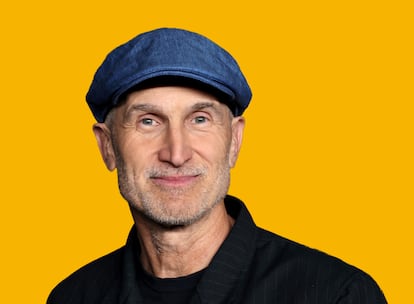Craig Gillespie and the virtual fraud that shocked the world: ‘Many thought they were playing in the same conditions as Wall Street, and that’s not the case’
EL PAÍS spoke with the filmmaker behind ‘Dumb Money,’ the story of the Reddit users who in 2021 made a fortune by ruining investment funds

The name might not ring a bell to you, but it would be hard to find a person who has never seen a film by Craig Gillespie, an Australian filmmaker that always delivers more than expected. He contributed to the modern wave of live-action Disney titles with an above-average movie — Cruella (2021), whose sequel is already in the works —, did one of the best remakes of a 1980s horror classic to date — Fright Night (2011) —, and proved that he was capable of doing one of those biopics that the Academy likes so much, I, Tonya (2017), with more style and skill than other flicks whose lifespan does not go beyond the awards season.
His emergence into independent cinema, Lars and the Real Girl (2007), a tragicomic romance between Ryan Gosling and an inflatable doll, caught the attention of Steven Spielberg, who recruited him for the series United States of Tara (2009). “What struck me the most was his joy of filmmaking and how clever he was. There was no hierarchy there. He was purely there to help and enable. That kind of support was invaluable, and I carried that with me throughout my work,” he tells EL PAÍS via video conference.
The director plans to present Dumb Money next week at the San Sebastián Film Festival, in Spain. The movie revolves around the GameStop case, when, in 2021, a group of Reddit users coordinated to buy cheap shares of the popular video game store chain and hike their price up to thirty times, an unexpected move that caused investment firms such as Melvin Capital — which bet on companies that are close to bankruptcy in order to profit from their losses — to lose billions of dollars. The scandal erupted at the moment when supposedly democratizing stock market access companies like Robinhood restricted users from buying more shares.

“It was during Covid-19. I’ve got two sons, and my youngest son was 24 at the time. Very early on, he was on [the Reddit forum] WallStreetBets, following GameStop for months in advance,” he recalls. “I was living through all of that with him, so I got to go on this very intense emotional roller coaster, you know, the outrage and frustration of the system.”
“I think that the system was in control of them. They thought they would be playing in the same conditions as Wall Street and the big wealth, and that’s not the case,” he continues. The film is based on a book by Ben Mezrich, the author of the text on which The Social Network (2011) was based, ironically titled The Antisocial Network. The isolation of the characters is, in fact, an essential aspect of Dumb Money, a unique film which rigorously depicts its context, including facemasks, safe distance and other details of the Covid-19 era, generally omitted by Hollywood.
The filmmaker explains that the pandemic had a lot to do with the GameStop movement. “We saw how people had been alienated, there was a kind of disconnection. However, the online world was very much alive.” The use of facemasks in the film is not only a matter of historical fidelity: “We used the mask theme to show the difference between the classes. The wealthier, the higher class doesn’t wear masks, while the people who work do. We wanted to show this dichotomy.”

The director, who has a great ability to bring out the best in his stars (Margot Robbie got her first Oscar nomination for I, Tonya, and Emma Stone’s performance was the clear highlight of Cruella), presents a first-rate cast in Dumb Money: Paul Dano as Keith Gill, financial analyst, YouTuber and the head of the operation; Pete Davidson as his brother; Seth Rogen as the founder of Melvin Capital; America Ferrera as a nurse on the front lines of the health crisis; and Sebastian Stan as the head of Robinhood. When you work with so many stars, he explains, what is difficult is finding the time to rehearse, as one has to work around their tight schedules. “Paul Dano was there between 8 and 9 days,” he says. “They have to be very well-prepared, and the truth is that there is a lot of spontaneity.”
The revenge of the outsiders
For Rogen and Stan, this was not the first time working with Gillespie. Both had already been under his command in the controversial Pam & Tommy (2022), of which he directed the first three episodes. In the series, which chronicles the media frenzy around the sex tape that was stolen from Pamela Anderson in the 1990s, Sebastian Stan played Tommy Lee, Anderson’s partner and Mötley Crüe’s drummer, and Seth Rogen played the worker who committed the theft. “What I’m interested in is the stories of the outsiders,” explains the director. Anderson did not participate or provide any advice and was actually very critical of the project, which was based on a peculiar approach: the trigger for everything that happened was the revenge that the worker sought against the abuse, intimidation, and humiliation that he had suffered at the hands of the powerful rock star.
In the case of Dumb Money, the class antagonism is not only evident in the context or the nature of the conflict: the film also reflects the awkwardness of a contest in which, at the end of 2020, GameStop offered 10 hours of extra work as a prize for the most viral TikTok dance. “I wanted to capture the outrage, the frustration that’s happening across the country, across the world right now. That’s what ignited [the film],” he explains. In this sense, he emphasizes the journalistic investigative work of screenwriters Rebecca Angelo and Lauren Schuker Blum, who were in charge of filling the void around the elusive Keith Gill, who after earning a figure close to $50 million with GameStop stock decided to disappear from public life.

Angelo and Blum are also behind the selection of songs for the film, despite the fact that musical montages are practically a distinctive sign of his work. “Kendrick Lamar, Megan Thee Stallion… the songs that appear in the movie, they came in the script. What I like most about using songs instead of a simply instrumental soundtrack is that the songs are more complex, they are not so specific, they don’t manipulate you in the sense that they make you feel certain emotions.”
After a while, the conversation inevitably turns to the strikes that are currently taking place in Hollywood, both of screenwriters and actors, the reason why the film is not being promoted by those who appear in it. The actors’ strike has lasted more than two months and the screenwriters’ strike is approaching five, still without an agreement in sight regarding better conditions or the protection they demand against the advance of artificial intelligence. “I think it’s indicative of society at the moment. This massive feeling of the haves and the have-nots. That big difference is something that we have to fight,” he says. “I’m very supportive of the strike. Everyone should have a fair share.”
Sign up for our weekly newsletter to get more English-language news coverage from EL PAÍS USA Edition
Tu suscripción se está usando en otro dispositivo
¿Quieres añadir otro usuario a tu suscripción?
Si continúas leyendo en este dispositivo, no se podrá leer en el otro.
FlechaTu suscripción se está usando en otro dispositivo y solo puedes acceder a EL PAÍS desde un dispositivo a la vez.
Si quieres compartir tu cuenta, cambia tu suscripción a la modalidad Premium, así podrás añadir otro usuario. Cada uno accederá con su propia cuenta de email, lo que os permitirá personalizar vuestra experiencia en EL PAÍS.
¿Tienes una suscripción de empresa? Accede aquí para contratar más cuentas.
En el caso de no saber quién está usando tu cuenta, te recomendamos cambiar tu contraseña aquí.
Si decides continuar compartiendo tu cuenta, este mensaje se mostrará en tu dispositivo y en el de la otra persona que está usando tu cuenta de forma indefinida, afectando a tu experiencia de lectura. Puedes consultar aquí los términos y condiciones de la suscripción digital.









































